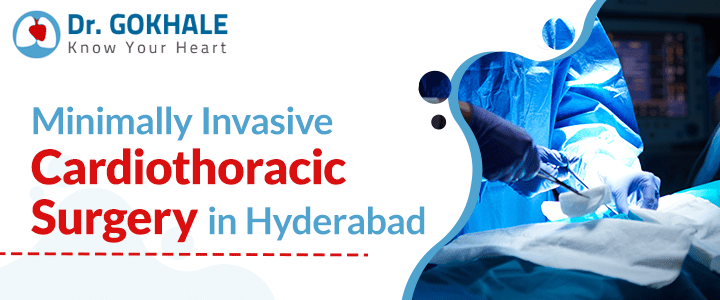Cardiothoracic surgery is a specialized field that focuses on treating diseases affecting the heart, lungs, and other organs in the thoracic cavity. Conventional cardiothoracic surgeries have been highly challenging due to the complex anatomy, the need for larger incisions, and the potential for complications, which usually prolong recovery times and sometimes increase risks.
Fortunately, with the emergence of minimally invasive cardiothoracic surgeries, cardiothoracic surgeons in India now have access to advanced techniques that drastically reduce the size of incisions and enhance precision, leading to improved surgical outcomes, shorter hospital stays, and faster recovery.
With insights from the best cardiothoracic surgeon in South India, Dr. Alla Gopala Krishna Gokhale, let us understand more about the procedure of minimally invasive cardiothoracic surgery and its benefits.
Minimally Invasive Cardiothoracic Surgery: Types
Today, minimally invasive procedures treat various medical conditions affecting the heart, lungs, and other organs in the chest cavity. Some of the most common surgeries and procedures performed with minimally invasive techniques include:
Minimally Invasive Heart Surgeries:
- Coronary artery bypass grafting (CABG)
- Atrial fibrillation treatment (e.g., maze procedure, catheter ablation)
- Septal defect repair (e.g., atrial septal defect closure)
- Valve repair or replacement (e.g., mitral valve repair, aortic valve replacement)
Minimally Invasive Lung Surgeries:
- Lung biopsy (e.g., for diagnosing lung cancer or other lung diseases)
- Lung resection (e.g., lobectomy, wedge resection, segmentectomy)
- Treatment of lung nodules or masses
- Pleural procedures (e.g., thoracoscopy for pleural biopsy or drainage)
Minimally Invasive Esophageal Surgeries:
- Fundoplication (anti-reflux surgery)
- Heller myotomy (treatment for achalasia)
- Esophagectomy (removal of part or all of the esophagus)
- Treatment for esophageal cancer or other esophageal disorders
Thymus and Mediastinal Surgeries:
- Thymectomy (removal of the thymus gland)
- Treatment for myasthenia gravis or thymoma
- Mediastinal tumor resection
Minimally Invasive Chest Wall Surgeries:
- Treatment for chest wall tumors or infections
- Rib resection or chest wall reconstruction
- Pectus excavatum repair (correction of a sunken chest)
Minimally Invasive Cardiothoracic Surgery: Procedure & Benefits
Minimally invasive cardiothoracic surgery uses a specialized approach that utilizes tiny multiple incisions and advanced surgical instruments to access the chest cavity.
During the procedure, the surgeon makes several tiny incisions near the chest wall. A Thoracoscope containing a small camera and a light source is inserted to illuminate the chest cavity for visibility. The Thoracoscope helps the cardiothoracic surgeon get a clear view of internal structures displayed on an adjacent monitor. With a clear view like never before, the Thoracoscope helps the cardiothoracic surgeon perform the surgery precisely.
“Unlike the conventional approach that requires larger incisions, leading to longer recovery and complications, minimally invasive cardiothoracic surgeries minimize trauma, improve precision, reduce postoperative pain, and expedite recovery,” says the best cardiothoracic surgeon in Hyderabad, Dr Gokhale. Some of the notable benefits of minimally invasive procedures include:
Reduced trauma: The smaller incisions mean less tissue and muscle damage, reducing patient pain and discomfort.
Minimal scarring: Conventional procedures leave prominent scars, making patients self-conscious about their appearance. Due to their tiny incisions, minimally invasive techniques lead to tiny scars that heal inconspicuously.
Improved precision: With greater visibility and improved access to the organs, minimally invasive procedures offer greater accuracy, reducing complications and potential damage to surrounding tissues.
Faster recovery and quick return to normal activities: Less pain and minimal tissue damage lead to faster recovery and shorter hospital stays than conventional procedures. The expedited recovery process and shorter stays enable patients to return to regular activities faster.
Dr Alla Gopala Krishna Gokhale: The Best Cardiothoracic Surgeon in India
Minimally invasive techniques are a boon for patients who detest conventional surgeries that are often associated with longer recovery timelines. But they require advanced expertise to perform accurately and safely. Cardiothoracic surgeons must undergo specialized training, have a deep understanding of the intricate anatomy involved, and achieve proficiency in using specialized instruments and technologies to leverage the benefits of minimally invasive techniques fully.
A pioneer in minimally invasive procedures, Dr. Gokhale, is the best cardiothoracic surgeon in India, with an exceptional track record in performing minimally invasive cardiothoracic surgeries. If you seek consultation, you can consult him here.
 Ask Doctor
Ask Doctor
